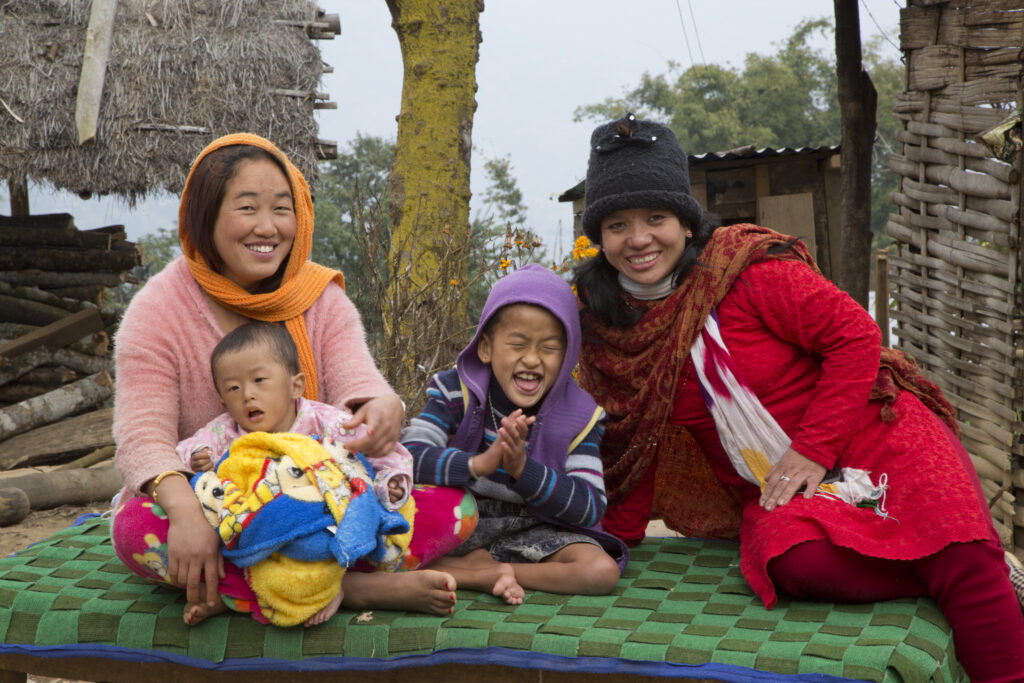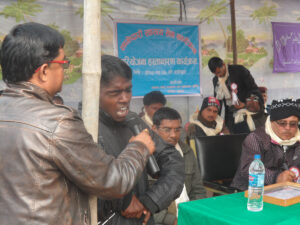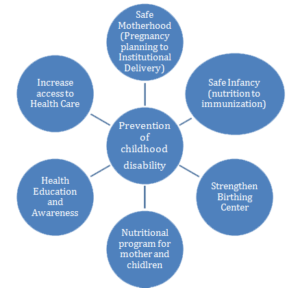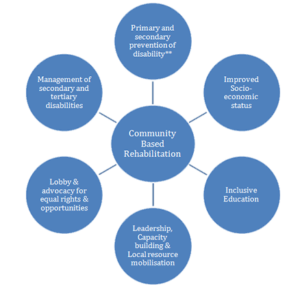Get to know our
Past Project
Inspire2Care
Project Period: 2011-2015 (pilot phase), 2015-2019 (first generation), 2016-2020 (second generation)
Project Area: 27 VDCs in Ilam and 4 VDCs in Jhapa
Direct Constituents:-
Persons with disabilities and their families :10,665 (Person with disabilities-2,133; family members- 8,532)
Pregnant women and their families:17,540 (Pregnant women-3,508; family members- 14,032)
Under five children and their families:58,168 (U5 children- 14, 542; family members- 43, 626)
Indirect Constituents:- 44,144

Inspire2Care (earlier known as Prevention and Rehabilitation Program) is directly focused on Karuna’s mission (saving children from disability, one by one) and is complementary to the health care system and disability policy of the Nepalese government. This is a community model aimed at preventing avoidable disabilities among children and adults and creating an enabling environment for children and adults with disabilities and their families by strengthening communities. In this program, we work to strengthen the maternal and child health services and early detection together with management as an approach for preventing avoidable disabilities whereas CBR matrix as a tool for rehabilitation of persons with disabilities. Strengthening of maternal and child health services goes beyond prevention of birth defects to the decrease in maternal and child mortality and improvement in health and nutritional status of both.
The project was piloted in three VDCs of Sunsari and four VDCs of Rasuwa. After the pilot, evidences were generated that paved the way for scaling up of CBR approaches. We are able enough to engage with big Foundations like Liliane Foundations and UBS Optimus Foundation. The aim is to scale is up in whole district in Ilam with ambition that central government will roll the program to other districts with the evidence from Ilam. The project is also ongoing in five villages of Rasuwa integrated with Reconstruction and Rehabilitation Holistic Development Project.
This is a community owned project with cost sharing , implemented in partnership with Health Facility Management and Operation Committee (HFMOC). Village Disability Rehabilitation Committee (VDRC), Disabled People’s Organization (DPO) and Self Help Groups (SHGs) of persons with disabilities and/or their families are the primary stakeholders of the project.
In every village, HFMOC appoints a Community Based Rehabilitation Facilitator (CBRF) to carry out activities of the project.
Coverage of Inspire2Care project in different districts
| Year | Project District | # VDC covered | Partners |
|---|---|---|---|
| 2011-2015 | Rasuwa Sunsari | Four Three | KF Netherlands |
| 2015-2019 | Ilam Jhapa | Twelve Three | KF Netherlands LF NLR |
| 2016-2020 | Ilam Jhapa | Fifteen One | UBS |
Best Wishes Program
Best Wishes Program is a tool developed by Karuna Foundation Nepal to capture data of pregnant women and to track whether they utilized recommended Antenatal Care services, institutional delivery and Post Natal Care services. There is a mechanism to inform about the defaulter so that health workers can follow up with the women.
Best wishes card is delivered to every pregnant woman by Female Community Health Volunteer which contains information about safe pregnancy, safe delivery and safe infancy. Mobile messaging technology is used for the flow of information on registration of pregnancy, due dates of services and confirmation of services used.
Inspire2Care Project Components
Share&Care
Project Period: 2008-2015
Project Area: Four villages of Sunsari District
Direct Constituents: 40, 289 (includes 209 children with disabilities and their families)

Share&Care is a project that has all the components of Inspire2Care with addition of Community Based Health Insurance. The objective of Share&Care is to develop Community Based Health Insurance Model aiming to increase the access of affordable and adequate health care for all the beneficiaries of the project area. The Health Facility Management and Operation Committee (HFMOC) manages the program. Karuna Foundation implemented Share&Care in eight VDCs in three districts. The project is successfully running in four VDCs of Sunsari: Aurabani, Bhaluwa, Bokhara and Madhesa even after exit of Karuna Foundation Nepal.
Holistic Development Projects
Holistic Development project aims at bringing progressive change in the community keeping the most marginalized families at the center. This is an approach to provide everyone the platform to grow to the fullest narrowing the gap between the affluent and the effluent.
We are currently running two projects under this frame;
1. Integrated Package for Holistic Development of MUSAHAR community of Bhaluwa VDC in Sunsari District and
2. Rehabilitation and Reconstruction- Holistic development project in five VDCs of Rasuwa district in post-earth quake scenario. Learning and experiences from both the projects will be combined and a comprehensive and impact creating Holistic way of approaching communities shall be developed based on the results of these projects.
# Integrated Package for Holistic Development of MUSAHAR community of Bhaluwa VDC in Sunsari District
Time Period: 2014 to 2017
Project Partner: FEMI
Project Area:Musahar Community, Bhaluwa, Sunsari
Direct Constituents: 212 families
The goal of the project is to create an environment where holistic development of Dalit (Musahar, Paswan and other so called untouchable castes) community of Duhabi-Bhaluwa municipality could be achieved by increasing access to health services, education and livelihood; enabling them to make choices and utilize opportunities. The target population consists are Dalit communities living in three clusters in Duhabi-Bhaluwa Municipality.
Immediate Results
- 1. Birthing center supported for construction
- 2. Installation of 13 tube wells
- 3. 109 Dalits enrolled in Community Based Health Insurance
- 4. A total of 88 families constructed toilets
Outcome (until December 2015)
- 1. Reduced drop out of students from the school
- 2. All families have at least one family member making minimum NRS 7500 per month
- 3. More than 50% HH are ensured by community based health insurance
- 4. 100% birth registration of new born babies
- 5. 74 % have Citizenship Card
# Reconstruction and Rehabilitation Holistic Development Project
Time Period: August 2015 till July 2018
Project Partner:Reach Out Too
Project Area: 5 VDCs of Rasuwa District
Direct Constituents:-
Pregnant women and their families:1,610 (pregnant women: 322; families of pregnant women-1288)
Under five children and their families:5,835 (U5 children-1,167; families of U5 children-4,668)
Persons with disabilities and their families :1,122 (Persons with disabilities-224; families of persons with disabilities- 898)
Other marginalized groups:1,157
From Health Facility Reconstruction and Repair:33, 301
Indirect Constituents:-1,811
Among the 14 earthquake affected districts, Rasuwa was severely affected. When compared to the proportion of casualties and damaged facilities, it stands at the top among the affected districts. About 98% of households were damaged while all the schools suffered some kind of obliteration. 17 out of 18 health facilities sustained some types of damage – 12 completely damaged and five partial damaged. This project is working on improving lives of 2,794 households through holistic development: conducting health, educational, livelihood and community empowerment activities.
Karuna Foundation Nepal is rebuilding 11 health facilities in earthquake resilient design using prefabricated materials and repairing three health facilities after signing a Memorandum of Understanding (MoU) with Ministry of Health (MoH).
The major objectives of the project are:
- 1. To increase access to and utilization of maternal and child health services by resuming and strengthening the health services .
- 2. To support the resumption of inclusive education services and enrollment in early child development centers, primary and secondary schools.
- 3. To restore and promote socio-economic activities for earthquake affected households with special focus on female headed households, households who lost the breadwinner, marginalized groups, persons with disabilities and elderly.
Immediate Results:
Health
- 1. Two health post completed and handed over to MoH
- 2. Nine health posts under reconstruction process
- 3. Three health post under repair
Education
- 1. Three schools under reconstruction in partnership with School Management Committees
Livelihood
- 1. Livelihood Need assessment completed
- 2. Five Self Help Groups formed
Social Empowerment
- 1. School based inclusive child clubs formed
- 2. Mothers groups have been either newly formed or re-activated in project areas
- 3. One Hoarding board on prevention of violence against women placed
Post Earthquake
Background
The disastrous earthquake hit Nepal on 25th April 2015 with several aftershocks that claimed lives of over 8,000 people, destroyed over 600,000 houses and thousands of public buildings.
Why Karuna stepped into relief and rehabilitation?
- 1.Earthquake survivors were in dire need of humanitarian support
- 2. Project districts of Karuna were severely hit by the earthquake
- 3. Knowledge of the local context, especially in the field of children and adults with disabilities and their families
- 4. Realizing the vulnerability of persons with disabilities and their families and post-partum mothers during disasters and rescue phase
- 5. Government was looking support from all Development Partners
- 6. Strong network within country and at the international level
- 7. All the team members realized that they should get involved into it
Policy, Advocacy, Awareness and Networking (PAAN)
Policy, Advocacy, Awareness and Networking (PAAN) encompasses the activities conducted for raising awareness among stakeholders and beneficiaries, to influence policies and to coordinate with disability focused and disability mainstreaming organizations to bring synergy in the works we do. This also includes advocating with the duty bearers to have the rights of every individual realized in every form. Likewise, Karuna Foundation has been working on creating awareness on disability and its prevention at local level.
Since the period of inception, Karuna Foundation has been lobbying and advocating for the rights and opportunities for persons with disabilities. PAAN aspires to influence the policies at the national level and planning at central, district and VDC level. Karuna also co-works to make government accountable regarding the implementation of the United Nations Convention on the Rights of Persons with Disabilities, which is ratified by the Government of Nepal.
Few of the events conducted by Karuna Foundation under PAAN includes, but not limiting to:
- 1. World birth defect day Celebration
- 2. Career Expo
- 3. Participation and contribution in construction of disability friendly public toilet
- 4. Reconstruction of disability friendly health posts
Furthermore, different publications have been supported to this part:
- 1. Resource book on disability in Nepali
- 2. Accessibility Guideline
- 3. Revision of CBR Guideline- under process
The final ambitions of the L&A work are:
- 1. To be able to expand the Inspire2Care project throughout the country
- 2. To create disability movement in Nepal
- 3. To be an example for the Nepalese government to effectively implement the UNCRPD- for most developing countries like Nepal. UNCRPD is ratified but its implementation is very weak in Nepal and Karuna tries to support the Government to effectively implementation so that rights of Persons with Disabilities are guaranteed.
WASH
Project Period: July, 2017 to June, 2020
Project Area: Duhabi Municipality 1-6, Sunsari
Target Group:4577 Household of Duhabi focusing 425 Dalit households
Karuna Foundation Nepal adopts holistic approach of development targeting at bringing progressive changes in the lives of most disadvantaged and marginalized communities in different districts of Nepal. We believe in creating an environment where holistic development of communities is possible only through increasing access to health services, education and livelihood.
Based on the learnings and experience of Dalit Empowerment and Post Earthquake rehabilitation and reconstruction project in Rasuwa, Up Scaling Max WASH in Nepal-Integrated WASH, Health, Empowerment and Livelihood Intervention project was developed Nepal-Integrated WASH, Health, Empowerment and Livelihood Intervention project in partnership with MAX Foundation and FEMI Foundation. The general objective of this project is holistic development of the community through reducing prevalence of water and faecal borne diarrhea and malnutrition among under two and under five children and enhancing educational and livelihood opportunities for children and adults from Dalit communities in Duhabi Municipality 1-6, Sunsari. Under reduction of malnutrition, the focus is to reduce stunting through integration of WASH, Nutrition and SRHR.
Thus this project is focused to promote Water, Sanitation and Health facilities among the Dalit communities and simultaneously empower and enhance their access to education and livelihood opportunities. The integration of livelihood, education and empowerment on existing WASH, maternal and child health aided in bringing synergy to make tangible changes in the lives of most disadvantaged Communities.





Embrace the Change (ETC)
Project Period: May 2017 to March 2018
Project Area: Kathmandu
Target Group:People in wheelchairs and their families
Target Audience:Media, public builders and government sectors

Embrace the Change (ETC), is one of the projects of KFN, which advocates to improve the perception of the public towards people in wheelchairs through social media campaigns, awareness drives and advocacy. Following were the objectives scoped under the project:
- To improve the perceptions of media, public builders and general public regarding the capability and image of people in wheelchairs through intensive workshops, awareness videos sharing, sharing platforms and recreational activities;
- To empower people in wheelchairs and their family member through empowerment workshops;
- To raise the disability issues such as physical and attitudinal barriers towards people with disabilities across the nation and contribute to increasing awareness and removing prejudice so people in wheelchairs can live dignified lives.
Though it is too early to state that certain outcomes are results (direct or indirect) of the activities carried out under the ETC project, the reach of people in wheelchair and public during different sensitization events remained significant. Likewise, the views generated by the sensitization video remained encouraging. In all, the project team believes that the objectives of the project have been met to a greater extent.
Two sensitization workshops for media persons was conducted. In the first event, the ten journalists from different media sectors were sensitized on positive media portrayal of people in wheelchairs through sensitization workshop which was held on 23rd June 2017. As a result, five articles were published by the participants.
The second event entitled “Media Interaction on disability and public service Announcement/ Advertisement (PSA) Video Release” was held on 31st January, 2018. The total number of participants were 51 including 20 Journalists. The program was chaired by Govinda Prasad Adhikari, Chairperson of Karuna Foundation Nepal. We had Krishna Hari Baskota, the Chief Information Commissioner from Nepal Information Commission; Govinda Aacharya, President from Nepal Journalist Association and Sangita Khadka, Member from Press Council Nepal, the first as chief guest while the latter two as special guests.
Three events of “Empowerment training for people in wheelchairs and their families” were conducted each on 15th and 25th of August and 10th November 2017. A total of 56 participants (Male: 25; Female: 31) including 30 persons with disabilities were reached through those events. While the first one was conducted in Kathmandu, two of the others targeted people in wheelchair under rehabilitation at Spinal Injury Rehabilitation Center (SIRC) located in the outskirt of Kathmandu valley. This was done so to extend the reach of awareness programs to those who were in need rather than those reachable. The participants in wheelchairs and their families were trained on disability definition, problem definition, social issue analysis, disability laws and policies.
Likewise, two disability awareness videos were produced in the period under review. Through these videos, we were able to reach many people on Facebook and YouTube which helped to spread disability awareness among the mass. KFN in coordination with Road Safety Society Nepal (RSSN) and Nepal Spinal Cord Injury Sports Association (NSCISA) organized a Wheelchair Rally on 29 December 2017. The rally commenced from Pragya Pratisthan Bhawan, Kamaladi and concluded in Narayanchaur, Naxal, Kathmandu. The objective of the rally was to create awareness regarding the need of accessible infrastructures including buildings, public spaces and roads which enables wheelchair users on an equal basis and thus make the government bodies and general public responsive towards the present infrastructural barriers. Representatives from Ministry of Women and Social Welfare and National Federation of Disabled Nepal joined the program. A total of 70 people in wheelchairs and others participated in the rally.


